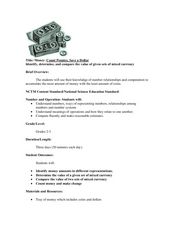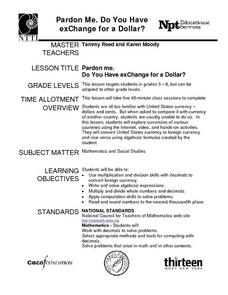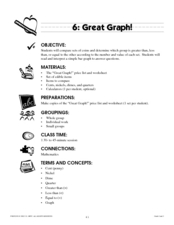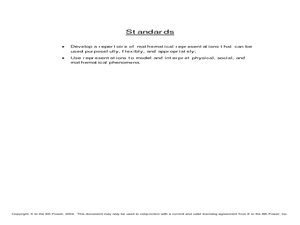Curated OER
Equal Value
Which coins add up to these values? Young mathematicians examine five cent values, circling the coins needed to amount to them. Next, they compare money values in four sets of coins. First, learners add up each set to find the total...
Illustrative Mathematics
Money in the Piggy Bank
It's time to crack open that piggy bank and see what's inside. First, count up the pennies, nickels, dimes, and quarters, identifying what fraction of them are dimes. Then calculate the total value of the coins, writing another fraction...
Curated OER
Place Value of Decimals to Hundredths: Diving for Decimals
Constructing decimals correctly is a crucial concept for elementary students to grasp. Here, have the young mathematicians in your class explore standard and expanded form while comparing decimal values. This unit is taught while...
Curated OER
Money
Students practice counting money. In this counting and comparing money activity, students review the value of coins and use play money to count out five dollars. Students complete a worksheet to determine what items they...
Curated OER
Who Has More Money?
Coloring and money combine in this fun instructional activity! First and second graders count the amounts of money represented in each, and then color the person or animal who has the most money. They then draw the correct coins to add...
Curated OER
Comparing and Ordering
Before handing out this number comparison activity, ask scholars to pick a number between 20 and 50. Could they do it? Explain that they chose a number greater than 20 and less than 50, which is exactly what they will be doing next. Each...
Curated OER
Money: Count Pennies, Save a Dollar
Learners determine how to make the largest sum of money using the least amount of coins. In this mixed currency lesson plan, students listen to a reading of If You Made a Million by David M. Schwartz before participating in money...
Curated OER
Counting Money and Making Change
Students count collections of coins and one-dollar bills. They solve problems and learn to use the dollar sign ($) with the decimal point to represent money amounts. This lesson is important as a foundation for future math concepts in...
Curated OER
What's All this Money Madness?
Second graders examine the value of money. In this money instructional activity, 2nd graders read the book Money Madness by David A. Alder and watch Brain Pop Jr. videos. Students discuss why we need money and how people earn money....
Curated OER
Recognizing Coins
Help your class identify the different pence and pounds used in Great Britain. Each slide contains an image, the name, and value of British coinage. Great if you're teaching in Britain, if you want to extend your American class's...
US Mint
Coin Connections
Help young mathematicians make cents out of the US currency system with this two-part math lesson. Children first learn the names and values for each type of coin, before learning to count and compare the values of coins using the...
EngageNY
Using Expected Values to Compare Strategies
Discover how mathematics can be useful in comparing strategies. Scholars develop probability distributions for situations and calculate expected value. They use their results to identify the best strategy for the situation.
Curated OER
The Price Is Right - TV Game Show
Learners play variation of TV game show "The Price is Right" to identify coins and their values.
Curated OER
Comparing Values: Comparisons Between Musical Notation and Money
Learners identify ways in which the principles and subject matter of other disciplines taught in school, specifically math, are interrelated with those of music.
Curated OER
Pardon Me. Do You Have Change For a Dollar?
Upper elementary and middle school learners explore currencies from a variety of countries. They use the Internet, video, and engage in hands-on activities. They practice converting U.S. currency to foreign currency and vice versa. This...
Curated OER
Great Graph!
Here is a fantastic lesson counting coins, interpreting graphs, and the concept of "greater than" and "less than." Young mathematicians utilize worksheets embedded in the plan in order to practice these concepts. The worksheets are...
Curated OER
Pocket Change
Students practice identifying coins and their values. In this money identification lesson, students play a game, where they toll a coin, determine the value, and compare totals to win.
Curated OER
Money
Students count money using only coins. In this money instructional activity, students read Bennies Pennies, practice counting the pennies in the story and are then introduces to the different coins, penny, nickel, dime and...
Curated OER
A Lesson to Accompany "Benjamin Franklin and the Birth of a Paper Money Economy"
Students examine the role of money in the colonial economy by participating in a trading activity. In this colonial economy lesson, students complete an activity to learn about colonial trade and what happens when there is a lack of...
Curated OER
Money, Commercial Banking, and Interest
Stdents explore the operation of the commercial banking system and the mechanics of money creation through the lending process. They investigate various interest rates to develop the relationship between interest rates and risk and...
Curated OER
Count, Compare and Make Change
Second graders review the value of coins and how to make change. In this counting money lesson, 2nd graders compare coins, practice making change, and review the value of coins using hands-on activities.
Curated OER
Smart- Counting Coins
Students discover the name and value of coins. For this counting money lesson, students identify heads and tails of coins and the value of each coin. Students visit websites and play games. Students then write a poem about money.
Curated OER
Quarters and Dollars
Second graders determine value of quarters and dollars, solve real-life problems involving money, and compare values of sets of coins and bills.
Curated OER
Value Your Digits
Third graders work with place value. In this place value lesson, 3rd graders write three digit numbers and tell the place value of each number. They compare numbers and money, regroup, discuss the value of coins, and count money.























